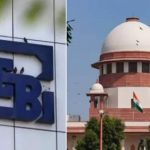
By K Raveendran
The Supreme Court has thwarted a move by market regulator SEBI to delay its investigation into the alleged manipulation of shares by the Adani group and issues that have been raised against the group in the wake of the Hindenburg report, which saw the share price of Adani companies nosedive.
In March, the apex court had directed the market regulator, which was already probing allegations against the Adani Group companies, to include the allegations levelled by Hindenburg in the scope of its probe and specifically investigate if there was a violation of the minimum public shareholding norms in public limited companies, failure to disclose transactions with related parties, and any manipulation of stock prices. SEBI’s original timeframe to complete the probe was May 2.
The market regulator had filed an application with the Supreme Court on April 29, seeking a six-month extension to complete its probe into the allegations levelled by US-based short-seller Hindenburg against the Adani Group. It was widely seen as a tactic to delay the probe which has come as a major embarrassment to the Modi government whose support to the group has always remained controversial.
A bench consisting of Chief Justice of India DY Chandrachud and Justices PS Narasimha and JB Pardiwala rejected the demand and allowed another three months to complete the probe. It is interesting that the experts committee appointed by the apex court under the chairmanship of retired judge Abhay Manohar Sapre and including veteran bankers KVKamath and OP Bhat, Infosys co-founder Nandan Nilekani, retired Justice JP Devdhar and advocate Somasekhar Sundaresan has already filed a status report well within the two-month mandate given to it. The committee was expected to suggest measures to strengthen frameworks, investigate the Adani row and suggest measures to strengthen the statutory framework.
Sebi sought the additional time on the pretext that the transactions that involved violations of norms, as raised by the Hindenburg report, was time-consuming and complex as these had several sub-transactions. Sebi, however, stated that it had formed a prima facie view on some of the allegations levelled in the Hindenburg report, including violations related to misrepresentation of financials, related party transactions disclosures, corporate governance matters, and minimum public shareholding norms. It also mentioned possible stock price manipulation and trading in Adani Group stocks in the periods before and after the Hindenburg report, as well as a possible violation of Overseas Direct Investment (ODI), Foreign Portfolio Investment (FPI), short selling, and insider trading norms. Sebi said that the detailed investigation process would also include depositions from various key managerial personnel, statutory auditors, and other relevant persons.
Advocate Prashant Bhushan, who was among the petitioners opposing the granting of additional time to the regulator, said that Sebi was a member of International Organisation of Securities Commissions (IOSCO) and could seek information from member countries, according to reports. The court seemed to have agreed with such assessment.
Hindenburg had said in report in January that entities controlled by the tycoon’s brother and his associates had used Mauritius as a conduit for money laundering and share-price manipulation. It also referred to a ‘vast labyrinth’ of shell companies from the Caribbean to the United Arab Emirates that was used for the execution of the fraud.
Hindenburg claimed that the shell companies were used to reroute money from India that was then used to buy shares in the group, and inflate their stock prices back home. In the five years prior to the bombshell report, Adani equities saw some of their wildest rallies, with flagship Adani Enterprises surging almost 2,600 percent, about 41 times the gain in the benchmark Nifty 50 index.
The publication of the report took the Adani stocks on a $153 billion downward spiral, which in turn wiped out the entire value of investments by millions of retail investors. Gautam Adani himself lost his title as Asia’s wealthiest businessman.
Hindenburg’s report further sharpened the focus on the billionaire’s ties with Modi, which are believed to have contributed to the tycoon’s clout in no small measure. The report itself had alleged that Adani pulled off ‘this gargantuan feat with the help of enablers in government and a cottage industry of international companies that facilitate these activities’ and that these issues of corruption permeated multiple layers of government.
Both the Adani group and the government alleged that the Hindenburg report was an attack against India, an argument that has failed to cut ice with either the Indian public or the international investment community. (IPA Service)
The post Supreme Court Sees Through SEBI’s Delaying Tactics In Probe Against Adani first appeared on IPA Newspack.


